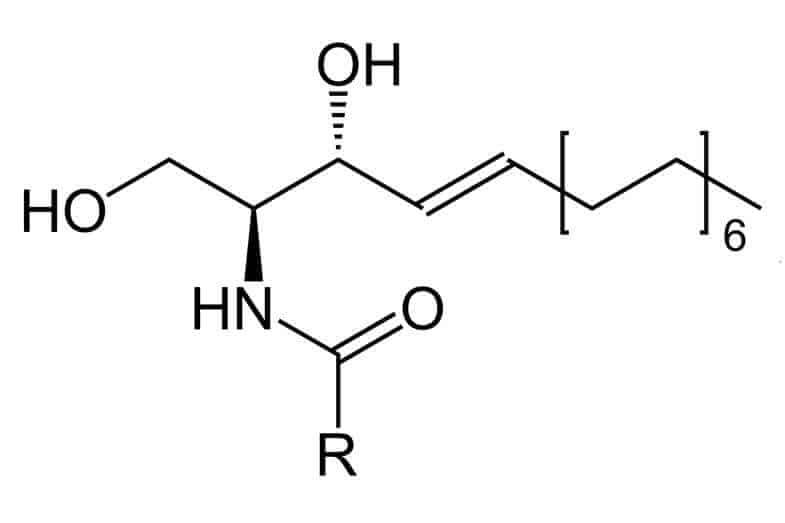If you’ve shopped for a moisturizer in the last couple of years, you may have noticed ceramides being advertised all over the place. Ceramides are a popular ingredient in many moisturizers.
They help retain your skin’s moisture and protect the skin’s barrier. But the question I want to address in this article is how long does it take for ceramides to work?
It takes about 5 days for ceramides to work on your skin. In about 1 to 3 months, with consistent use, you can achieve visible anti-aging results like improvements in skin elasticity and smoothness. The time it takes to see results depends on the turnover rate of your skin cells and how healthy you are.
On average, our bodies shed and re-grow skin every 27 days [1]. The skin of babies and kids shed and get replaced faster than that of adults simply because they are growing and developing, so you’ll easily notice their brighter-looking skin.
On the other hand, by the time middle adulthood sets in, we will need all the help we can get to bring back our youthful glow.
The good news is, ceramides are there to help us achieve our skin goals. Continue reading to learn more about ceramides and how long it takes for them to work.
Also, for an excellent ceramide moisturizing cream, take a look at our top pick, the CeraVe Moisturizing Cream | Body and Face Moisturizer for Dry Skin:
Click here to see it on Amazon.
How Long Does It Take for Ceramides to Work?
Do you know that ceramides are naturally found in our skin? Ceramides are lipids – a.k.a. fat molecules in the skin’s cell membranes, particularly on the outer layers of our skin. Ceramides are manufactured through any of the following:
- Enzymes that create ceramides from numerous similar molecules
- Breaking down of sphingolipids by enzymes
- Hydrolysis (chemical reaction through water) of the sphingomyelin lipid
So how long does it take for ceramides to work? As mentioned earlier, it only takes about a week for ceramides to work on your skin and see results. In a few months, you can achieve visible anti-aging results like improvements in skin elasticity and smoothness.
The time it takes to see results depends on the turnover rate of your skin cells. Usually, it takes about 1 month for an adult’s skin cells to completely turn over. Ceramides can deliver results sooner than 1 month, however, if you take good care of your health and follow a proper skin care routine.
See the below video for more about what ceramides are and how they work:
What Do Ceramides Do for Your Skin?
Since ceramides are “fat” molecules, they serve to regulate the loss of water from the skin and play a big role in protecting it from damaging elements. They act as a sealant or coating on top of and in between our skin cells.
They strengthen our skin, too, and because they are resistant to water, they not only protect our skin but also keep it from drying. In easy-to-remember terms, ceramides do three important things for the skin:
- Hydrate
- Protect
- Strengthen
They manage to hydrate, protect, and strengthen very quickly as the ceramides are versatile and work on most skin types. Your skin will welcome them as ceramides make up 50% of the skin barrier.
Properly tested and packaged skincare products containing ceramides will assist in strengthening the barrier of your skin and facilitate hydration – when used regularly. This results in a skin that is:
- Firmer – more toned
- Smoother – lesser fine lines, wrinkles, and dryness
- Less sensitive – less prone to irritation
Years ago, when my skin was dry, and I had a lot of eczema patches, I started using ceramide-based products and found almost immediate relief.
After only about 2 days of applying ceramide products, my skin felt more hydrated and protected. I found I only needed to use the ceramide products during the dry winter seasons.
Are Ceramides Recommended for People with Skin Problems?
Ceramides moisturize the skin, and for people who have skin problems like acne, it’s a common myth that ceramides might exacerbate the irritation.
However, dermatologists will all agree that because of the hydrating and protecting nature of ceramides, they play a significant role in caring for sensitive skin.
You can see results very quickly with ceramides if you have sensitive, dry skin.
Click here to see it on Amazon.
If you use a product that contains ceramides such as CeraVe, every day, your skin barrier will strengthen within about a week.
In fact, those who do not have enough moisture in their skin are bound to experience irritation, itchiness, redness, and dryness if they are using some medication to treat their skin condition. Doctors have warned, though, that products with potent chemicals or a high concentration of mineral oils should not be used as they can clog the pores.
To learn more about different ceramide products, check out the below video:
Where Can I Get Ceramides?

If we already have ceramides in the body, where can we get more of them? Aside from certain food items (which you’ll see later), ceramides are found in skincare products such as moisturizers, lotions, shampoos, and hair conditioners.
They can be in creams, serums, or liquids. But each product contains other ingredients, which set each one apart from the rest when it comes to efficacy and results.
Knowing now that we have natural ceramides in our skin and that synthetic skincare products with ceramides are available on the market, you might ask if there are other ‘natural’ sources of ceramides.
While synthetic products, when properly and regularly used, can give us a steady dose of ceramides, we can also replenish them the natural way through our diet. Some food rich in ceramides are:
- Rice
- Wheat
- Corn
- Sweet potatoes
- Soy
- Dairy
What Ingredients Do Ceramides Agree With?
Studies have shown that other skin-moisturizing ingredients, such as glycerin, cholesterol, and fatty acids, work really well with ceramides in enhancing the texture and tone of the skin, as well as helping it become less sensitive and prone to irritation.
Since no one ingredient can single-handedly do all the work of protecting and restoring the skin to its ideal form, ceramides work well with other components such as peptides (amino acid), retinol (Vitamin A), linoleic acid (found in plant oils), and niacinamide (Vitamin B3) which are great antioxidants.
Is It Safe to Use Ceramide Skin Care Products Regularly?
Read the label carefully before purchasing and using any skin-care product. While it’s generally safe to use synthetic products, it’s best to perform a skin test first to find out how a product will react to your skin.
- Simply use a tiny amount the size of a dime and apply it to the inside of your forearm
- If within 24 hours, you experience any irritation, itching or tenderness, then the product is not safe for you to use.
- If you don’t experience any adverse effects, then the product is safe to use.
What Happens If You Lack Ceramides?
Since we’ve already established that ceramides act as the skin’s protective and hydrating component, we should understand why having an inadequate amount of these fatty molecules may result in certain skin conditions.
Although not usually serious, these issues can still give us a bad day and a certain amount of discomfort.
Skin dryness can also be triggered by the winter season and if you are frequently exposed to harsh elements. In any case, the lack of ceramides tends to worsen the problem.
It will take longer for ceramides to work and do their job of healing and moisturizing your skin during the winter season. Dryness may manifest in one or a combination of the following:
- Redness
- Scaling, flaking or peeling
- Tightness, especially after bathing, showering or swimming
- Roughness of the skin
- Itchiness
- Signs of lines
- Cracks that may sometimes bleed
- Dull-looking skin
Of course, aside from moisturizers that contain a good amount of ceramides, one effective and preventive approach to skin dryness is drinking eight glasses of water a day to stay hydrated.
Still wondering what are ceramides and how long for ceramides to work? Check out the below video for a great explanation of the science behind ceramides:
Dry Skin from Ceramide Deficiency
Though skin dryness is not a serious matter, it can become one if left unchecked. More specifically, if your skin does not recover from its dry state, it could lead to serious skin conditions such as:
- Infections – skin that cracks become exposed to bacteria
- Eczema – a person who is susceptible to this kind of dermatitis tends to develop severe skin cracks and inflammation if the skin is always dry [2].
Let’s not blame dry skin solely on ceramide deficiency. Understand that other factors can also lead to dry skin or aggravate an already-present skin condition. These are:
- Using soaps, detergents or shampoos with highly concentrated chemicals that are strong, especially if you have sensitive skin.
- Climate and weather – humidity levels and temperature drop during winter or cold season, so the skin is more prone to dryness
- Hot showers and baths, especially if you linger on them, dehydrate your skin
- Frequent swimming in pools with chlorine
- Being directly exposed to heaters, stoves, burners, and fireplaces can deplete humidity, thereby drying your skin.
Ceramides will start working faster at delivering results if you combine the skin care product with other best practices for avoiding dry skin.
Do Ceramides Work at Strengthening Hair?
While ceramides are famous for their crucial role in skincare, recent synthetic formulations have led to the development of hair care products that contain ceramides. Of course, the objective is still the same: to help moisturize the hair strands and provide a protective layer.
Acting as a conditioner, the ceramide component in certain shampoos serves to strengthen the hair shaft by trapping the hair’s natural nutrients.
So, with all the discussion about the crucial role of ceramides in skincare, we have to understand how long it takes for ceramides to work.
Conclusion – How Long Does It Take for Ceramides to Work?
So, how long does it take for ceramides to work? As a skin moisturizer, you will feel an improvement in your skin through regular use for at least a week. If you’re after anti-aging effects like noticeable reduction in fine lines and firmer skin, it will take at least three months to work and start seeing results.
Remember that ceramides are lipid molecules that are naturally found in our skin. But by consuming food rich in ceramides (like soy, wheat, sweet potatoes, etc.) and following a skincare routine that involves daily use of moisturizers rich in ceramides, we can keep our skin well hydrated, glowing, firm, and protected from harmful elements.
Related reading:
How Long Does It Take for Retinol to Work?
How Long Does Salicylic Acid Take to Absorb?
Retin-A vs Benzoyl Peroxide vs Salicylic Acid for Body Acne






